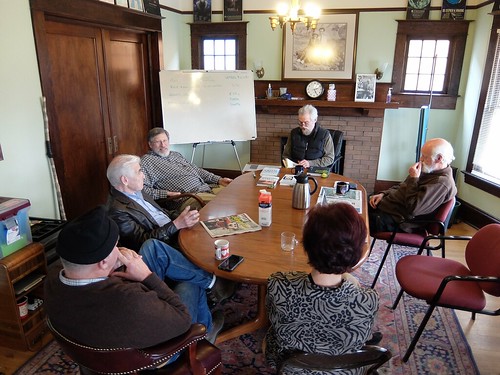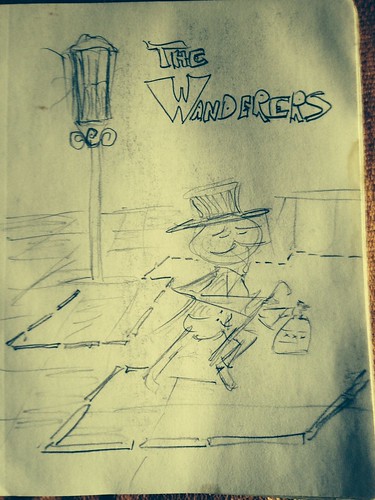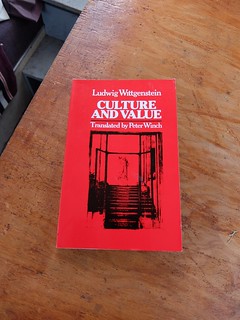I expressed my frustration with Culture and Value to Jon Bunce. Wittgenstein, a Vienna Circle vet, alludes in knowing tones to all these musical passages, yes by well-known composers.
It's only my ignorance that's showing through. Nevertheless, I could use a podcast version (anyone? Princeton?).
The podcast guides, the voices, would not need to share all of Wittgenstein's opinions, about Mahler's stuff for example. They'd not be disciples necessarily, but would play some of these missing puzzle piece passages while trying to get at the nuances Wittgenstein was hoping to get across in referencing them.
For Wittgenstein, music had the capability, especially in the hands of some composers, to approach language in its attributes and abilities. He used language and music as quasi-mirrors of each other, to gain deeper insights into both.
Glenn is talking about his Global Matrix as a useful summarizing tool. Geoscope. Macroscope. The Christian Science folks had their Mapparium. Yes, we're talking about a globe, which in projections gets flattened out, into a Mercator or whatever. Glenn's matrix is a data structure.
What distinguishes the Global Matrix from the Mapparium is Glenn is really into the "hexapent" (a word he doesn't like). Hexagonal tiling is more characteristic of certain game boards, including virtual boards like in Civilization.
We had two newcomers this morning, who've never heard Glenn present, so he had a good opportunity to summarize. We had some interesting discussion, focusing a lot on the Internet, but ranging to other topics.
Glenn derives a lot of his stuff from scratch, like a cook who invents many great dishes that other restaurants immediately recognize but have other names for. He builds on his own experience, as a crypt-analyst and project manager. The flavors he comes up with are subtly different, or even surprisingly different in some cases. Glenn has his own cuisine. Maybe he'll succeed where few others have dared to tread.
That reminds me, last night at the dinner party, Alice named my dessert drink, Soylent + Jack Daniels, a "kirbster". I doubt that'll stick. We geeks already have "headless chicken" for the Bloody Mary, an allusion to the etymology of "geek".
I expressed to Jon my concern that Wanderers might seem too intimidating from the outside. Would-be attenders might be concerned they'd be grilled, interrogated, by judgemental know-it-alls. But that's quite far from our ideal.
I recalled my suggested logo: that Monopoly guy wandering on a chess board, a "random walk", with a lamp post marking its beginning, a dotted line showing his path. Is he holding a bottle? Is that a triple-x on the label? He must be drunk right? And therefore wandering.
We're called Wanderers for a reason. We don't have alcohol at our weekly meetings (we do at our Equinox and Solstice celebrations). The wandering is more Ouija Board like at its best, recalling a Quaker meeting. We let the spirit move the conversation.
Jon and I got to talking about David Prideaux's No Big Bang in the kitchen, reviewing some of the main memes (elevators, acceleration, gravity...). Jon agreed that gravity affects wavelength. Light escaping from a massive body gets redshifted.
We also agreed the Monopoly guy had a much better chance of coming back to the lamp post in a 2D matrix, rather than in a 3D matrix of XYZ cubes, or perhaps rhombic dodecahedra, if using the IVM.
Before that I was out on the porch, phoning Carol Urner (mom), presumably in transit somewhere between Cape Cod and WDC, and Patrick Barton, asking for advice.
"What's a good entry point into what we're calling 'machine learning' these days?" was the gist of my question to Patrick, and "do we have to learn R?". I'd started reading on the topic in Safari On-Line earlier that morning.
Patrick suggested starting with a large publicly available database. Although we talked about baseball statistics, I actually don't know if those databases are open. I completely agree that a hallmark of that sport is its fascination with statistics.
When still with O'Reilly School, I'd suggested writing SQL-related curriculum against just such a stash, but again I have no idea to what extent this stash is available, and/or at what price.
How about a database of faces against which to run facial recognition algorithms? We could play a game like Memory, wherein every face is twice repeated and the machine's job, after a training period, is to recognize as many pairs as at can. Patrick suggested using mug shots of the very same baseball players (called "trading cards").
My angle on Machine Learning against Big Data is from the point of view of a code school curriculum writer / instructor, and wanting to lower a ladder to keep the topics accessible.
Where would we start with 8th graders? I think with success stories. Voice recognition, and OCR (optical character recognition) have come a long way in my day.
"Voice recognition" does not necessarily mean recognizing "who is talking" although that could be an application (biometrics), and would be more like fingerprint or retinal pattern matching (used to authenticate and/or determine identity). This is more Buzz's area.
The customary meaning of "voice recognition" in 2016 is that the computer correctly transcribe into writing what the speaker has said. Given advances in this area (didn't Tim Peters do work here?), people are talking into their devices a lot more, asking questions, and getting answers.
It's only my ignorance that's showing through. Nevertheless, I could use a podcast version (anyone? Princeton?).
The podcast guides, the voices, would not need to share all of Wittgenstein's opinions, about Mahler's stuff for example. They'd not be disciples necessarily, but would play some of these missing puzzle piece passages while trying to get at the nuances Wittgenstein was hoping to get across in referencing them.
For Wittgenstein, music had the capability, especially in the hands of some composers, to approach language in its attributes and abilities. He used language and music as quasi-mirrors of each other, to gain deeper insights into both.
Glenn is talking about his Global Matrix as a useful summarizing tool. Geoscope. Macroscope. The Christian Science folks had their Mapparium. Yes, we're talking about a globe, which in projections gets flattened out, into a Mercator or whatever. Glenn's matrix is a data structure.
What distinguishes the Global Matrix from the Mapparium is Glenn is really into the "hexapent" (a word he doesn't like). Hexagonal tiling is more characteristic of certain game boards, including virtual boards like in Civilization.
We had two newcomers this morning, who've never heard Glenn present, so he had a good opportunity to summarize. We had some interesting discussion, focusing a lot on the Internet, but ranging to other topics.
Glenn derives a lot of his stuff from scratch, like a cook who invents many great dishes that other restaurants immediately recognize but have other names for. He builds on his own experience, as a crypt-analyst and project manager. The flavors he comes up with are subtly different, or even surprisingly different in some cases. Glenn has his own cuisine. Maybe he'll succeed where few others have dared to tread.
That reminds me, last night at the dinner party, Alice named my dessert drink, Soylent + Jack Daniels, a "kirbster". I doubt that'll stick. We geeks already have "headless chicken" for the Bloody Mary, an allusion to the etymology of "geek".
I expressed to Jon my concern that Wanderers might seem too intimidating from the outside. Would-be attenders might be concerned they'd be grilled, interrogated, by judgemental know-it-alls. But that's quite far from our ideal.
I recalled my suggested logo: that Monopoly guy wandering on a chess board, a "random walk", with a lamp post marking its beginning, a dotted line showing his path. Is he holding a bottle? Is that a triple-x on the label? He must be drunk right? And therefore wandering.
We're called Wanderers for a reason. We don't have alcohol at our weekly meetings (we do at our Equinox and Solstice celebrations). The wandering is more Ouija Board like at its best, recalling a Quaker meeting. We let the spirit move the conversation.
Jon and I got to talking about David Prideaux's No Big Bang in the kitchen, reviewing some of the main memes (elevators, acceleration, gravity...). Jon agreed that gravity affects wavelength. Light escaping from a massive body gets redshifted.
We also agreed the Monopoly guy had a much better chance of coming back to the lamp post in a 2D matrix, rather than in a 3D matrix of XYZ cubes, or perhaps rhombic dodecahedra, if using the IVM.
Before that I was out on the porch, phoning Carol Urner (mom), presumably in transit somewhere between Cape Cod and WDC, and Patrick Barton, asking for advice.
"What's a good entry point into what we're calling 'machine learning' these days?" was the gist of my question to Patrick, and "do we have to learn R?". I'd started reading on the topic in Safari On-Line earlier that morning.
Patrick suggested starting with a large publicly available database. Although we talked about baseball statistics, I actually don't know if those databases are open. I completely agree that a hallmark of that sport is its fascination with statistics.
When still with O'Reilly School, I'd suggested writing SQL-related curriculum against just such a stash, but again I have no idea to what extent this stash is available, and/or at what price.
How about a database of faces against which to run facial recognition algorithms? We could play a game like Memory, wherein every face is twice repeated and the machine's job, after a training period, is to recognize as many pairs as at can. Patrick suggested using mug shots of the very same baseball players (called "trading cards").
My angle on Machine Learning against Big Data is from the point of view of a code school curriculum writer / instructor, and wanting to lower a ladder to keep the topics accessible.
Where would we start with 8th graders? I think with success stories. Voice recognition, and OCR (optical character recognition) have come a long way in my day.
"Voice recognition" does not necessarily mean recognizing "who is talking" although that could be an application (biometrics), and would be more like fingerprint or retinal pattern matching (used to authenticate and/or determine identity). This is more Buzz's area.
The customary meaning of "voice recognition" in 2016 is that the computer correctly transcribe into writing what the speaker has said. Given advances in this area (didn't Tim Peters do work here?), people are talking into their devices a lot more, asking questions, and getting answers.



